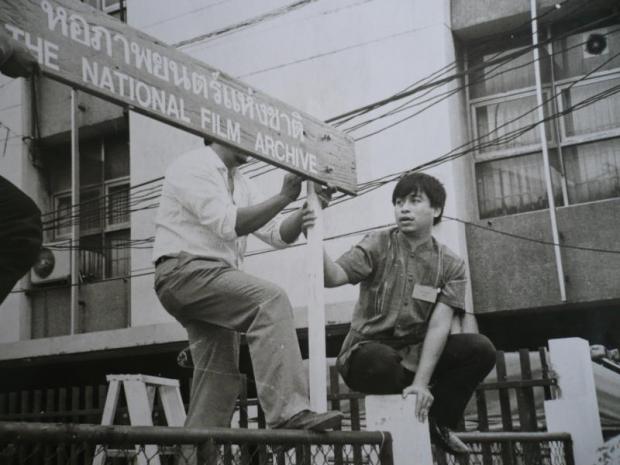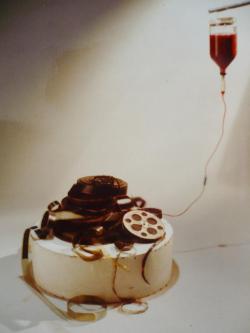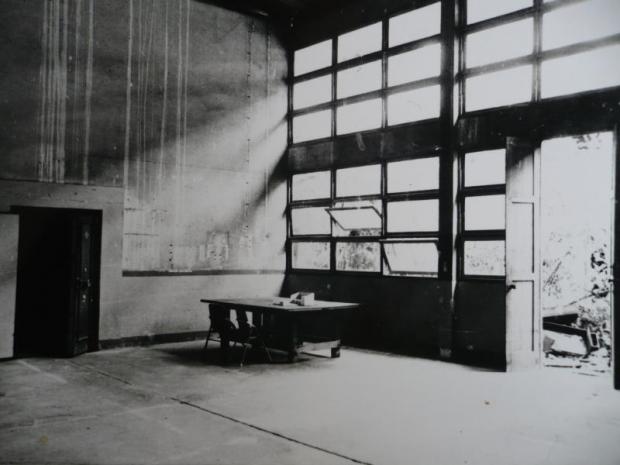The preservation of movies involves storing for posterity a popular form of entertainment, but perhaps more importantly this repository can also protect an invaluable body of knowledge and wisdom about the individuals and society from which these works emanated. It took this country a long time to realise that the conservation of film is a cultural duty, and that our audiovisual heritage is a museum of memories that plays a vital part in educating future generations about their collective past.
This Sunday, the Thai Film Archive, a body which enjoys "public organisation" status, will be celebrating its 30th anniversary. The tale of its journey from a neglected government unit tucked away in a twilight zone to an active, relevant agency that preserves and promotes film culture is well worth retelling.

Staff members put up the sign at the Film Archive's old office.
On Sept 7, 1984, the Ministry of Education, through the Fine Arts Department, agreed to the establishment of a national film archive. That was the official commencement date, but the real story began long before that. In 1966, a Unesco subcommittee advised Thailand's National Library to begin collecting films as part of its routine operations. Nothing came of that suggestion. Fast forward to the 1980s and a young cinephile named Dome Sukvong. He began campaigning for the establishment of a national film archive, reasoning that films were deserving of the same protection already extended to books, manuscripts and historical artefacts by our libraries and museums.
Initially he didn't receive much support, Dome recalls in a new documentary called The Dream Keepers, which will be shown at the 30th anniversary event this Sunday. Cinema was perceived then (and often now, too) as trivial, a distraction unworthy of any serious archiving efforts. Dome believed otherwise, and his dedication paid off, helped by a stroke of luck. In 1983, he was invited to attend a congress of the International Federation of Film Archives in Sweden. Serendipity? Dome remembered that King Rama V had visited the country in 1897, so while the young archivist was there, he attempted to track down newsreel footage shot during the Siamese king's trip.
A few months after Dome returned to Bangkok — with his hope diminishing — he received a letter from the Swedish Film Institute in Stockholm, informing him about the existence of a film reel showing King Rama V's royal visit to Sweden. The archive made a copy and shipped it to him.

A poster campaigning for the need to conserve film.
"I knew then that I would win what I'd been fighting for," Dome recalls. The footage proved to Thai bureaucrats that film could hold tremendous historical value, and that the need for a proper film preservation body was necessary and long overdue. The next year, the Fine Arts Department approved the plan to set up a national film archive.
Dome and the founding members — Penphan Charoenporn, Sakdina Chatrakul na Ayudhya, Somchart Bangjang and Prasit Deesilapakit — took up an abandoned yet elegant mint factory in the compound of the National Gallery on Chao Fa Road. They turned it into their office and began a task they would not finish even 30 years later. First, the team travelled around the country, collecting film and film materials — home movie footage, theatrical films, posters, magazines, projectors — and began building an archive.
"When we heard that there was a cinema closing down, for example, we rushed there in a van to take whatever they threw away," Penphan says in the documentary. "We realised that our first mission was to save whatever we could save before it was lost."
They also realised that an archive was not just a storage unit where old film prints were kept. An archival operation included caring for the collection and making it relevant to a modern audience. So began the preservation and restoration of old films, then a weekly movie screening in an improvised room with folding chairs and a hand-sewn canvas screen. On the bill were old films, Thai and international, from the archive's collection, as well as from other cultural institutes. The three main missions of the archive — preserving, restoring and distributing — are still going strong until today.
But the story continues. In 1995, Dome discovered fragments of the first Thai film in history — a two-minute remnant of Choke Song Chan (Double Luck) from 1927. The good news was followed by more uncertainty. In 1997, when the Fine Arts Department wanted to take back the former abandoned building that was serving as the archive's office, the operation was moved to Salaya. At the time, the area was rural, remote, nearly inaccessible and didn't have nearly cultural pull of Bangkok. Despite their paltry budget, Dome and his team relocated the archive's storage and office there, slowly building an attractive compound that includes a cinema and a Thai film museum.
Another milestone, which is recounted in The Dream Keepers, occurred when Dome fought for the archive to acquire "public organisation" status. In the mid-2000s, the Thai government encouraged state agencies to consider a special administrative model — called ong karn mahachon, or public organisation — that allowed greater autonomy and managerial freedom from the clumsy bureaucratic machine. Realising that this was the way for the archive to progress, Dome pushed and pushed, including waiting for hours on many days during many months — a time totalling eight years — at the doors of various ministers. Finally, in June 2009, the persuasion paid off. The cabinet approved the transformation of the archive into a public organisation, opening the door for the archive to pursue many dreams that were once impossible.
Today the archive employs over 70 staff members. Salaya, once a backwater location, is a bustling university town that doesn't seem too far away — traffic jams are one of the problems it now faces — and the organisation has been enthusiastic in promoting film-related activities, from regular film screenings to film festivals to children-oriented projects such as School Cinema. The 30th anniversary this Sunday is marks a long journey that will continue.
"The ultimate value of film is a tool for learning," says Dome. "Our motto here is 'cinema enlightens'. Sure, film has different dimensions; it can be commerce or entertainment. But its great benefit to mankind is its educational purpose and its path to help us see the truth.
"Knowledge, beauty, truth — they all come together in film."
The 30th anniversary of the Thai Film Archive (Public Organisation) will take place on Sunday at the film archive in Salaya. There will be a free screening of documentary The Dream Keepers, made especially for the event by director Panu Aree. The archive is on Phutthamonthon Sai 5, Salaya. Call 02-482-2013/4.

An abandoned mint factory on Chao Fa Road was transformed into the Thai Film Archive's first office.

A screening room at the old Thai Film Archive building, where films were shown every week.

The original staff members of the Thai Film Archive in the mid-1980s.

